The winters in Athens are usually mild. While you can expect some scattered snowflakes in the city center, the truth is that the snow in Athens melts quickly away. The white days never last long, even in the northernmost suburbs of the Greek capital, where the higher altitude gives better snow chances.
More or less, there’s one remarkable snowfall in Athens every decade. I was very young in 1987, but I still remember the snow. Then, I can recall the one in 1992 and clearly remember January 2002. In 2008 I was in Paris, so I missed the snow of this year, and then the next time I saw some proper snow in Athens was in 2019. However, the snow melted the following morning.
Yes, severe snowfalls are very rare in Athens. Although the mountains around the capital see proper amounts of snow every year, extreme snowfall is one that affects the whole region. In such cases, you can expect to see snow in the Acropolis and all along the coast. A sandy beach covered in snow is an eerie spectacle for sure.
On February 15, 2021, there was again snow in Athens. For 36 hours, an almost perfect snowstorm hit the capital. The cold front’s name was Medea (Greek: Μήδεια). There were signs of what was about to come already from Valentine’s Day. Sunday the 14th started with snowflakes, and the weather remained for hours. Then, from Monday night and all the way to Wednesday early morning, it kept snowing non-stop. Tuesday was a day of significant snowfall in central Athens and the whole Attica region.
The images of the snow-covered Acropolis went viral. Unfortunately, I didn’t have the chance to shoot some photos of the Acropolis due to the lockdown. Greece has probably the toughest lockdown in Europe, and moving freely around is punished (prohibited sounds light).
All that said, in this photo report from the snow in Athens, you will see images from my neighborhood, Halandri. No famous Greek landmarks, just a walk around a suburb full of snow plus some info. If you want to see the Acropolis in white, you can check it in Guardian’s article. I took all photos with the Ricoh GR ii, the small camera I use to run this blog (read my GR ii review).
Let’s start.
Snow in Athens
*It snowed again in Athens on January 2022. It was an even more extreme snowstorm, and you can see a video from the Cold Front Filippos above.
As I wrote earlier, the severe snowfall started on Monday night. After almost two hours, the roads began having snow. Around midnight the snow was everywhere, and I stepped quickly outside for a photo. It was freezing, but the atmosphere was clear. The sky was red and seemed full of snow.
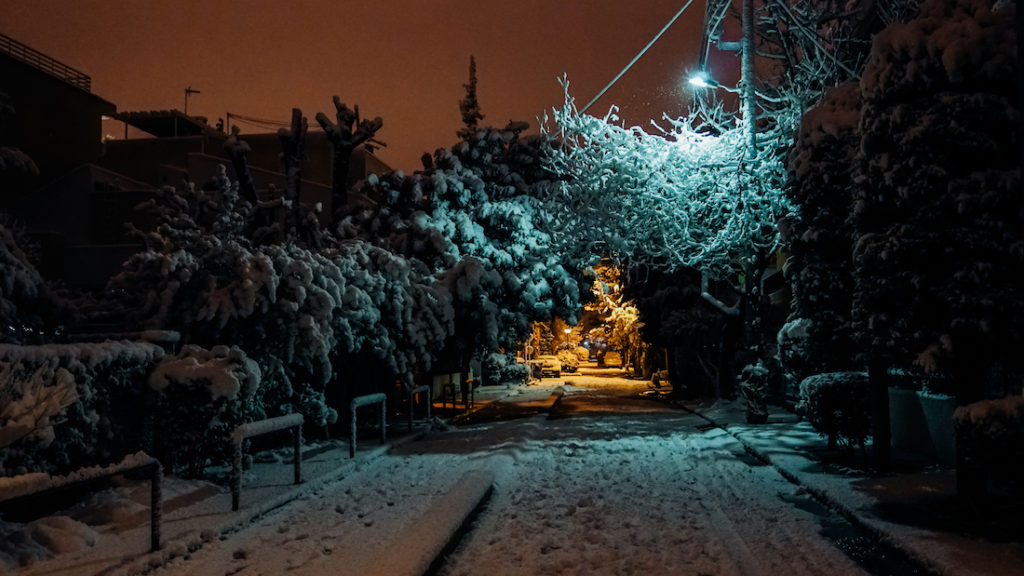
I stayed up till very late at night. After more than a decade in Berlin, I don’t crave snow anymore, but I must admit that it’s always beautiful to see the city in white. I went to bed around 4 pm. I was so excited that I had just slept five hours. In the morning, after a quick cup of coffee, I went outside. And that’s what I saw.
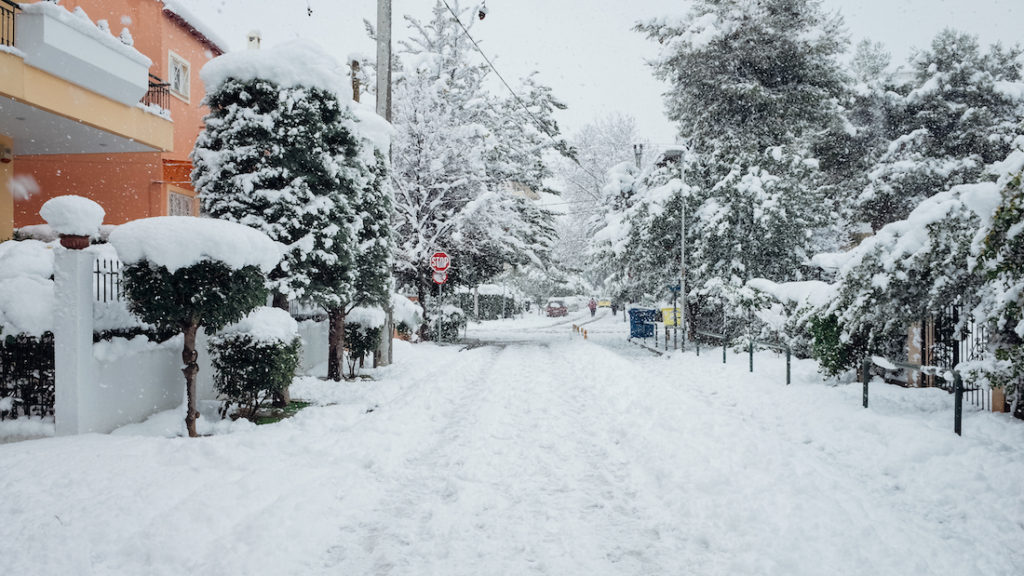
Further down the road, I saw the periptero of the hood. The Greek periptero is actually a kiosk where you can find daily life stuff -from newspapers and cigarettes to milk and light snacks. The written word on the tent meant icecubes and sounded almost ironic.
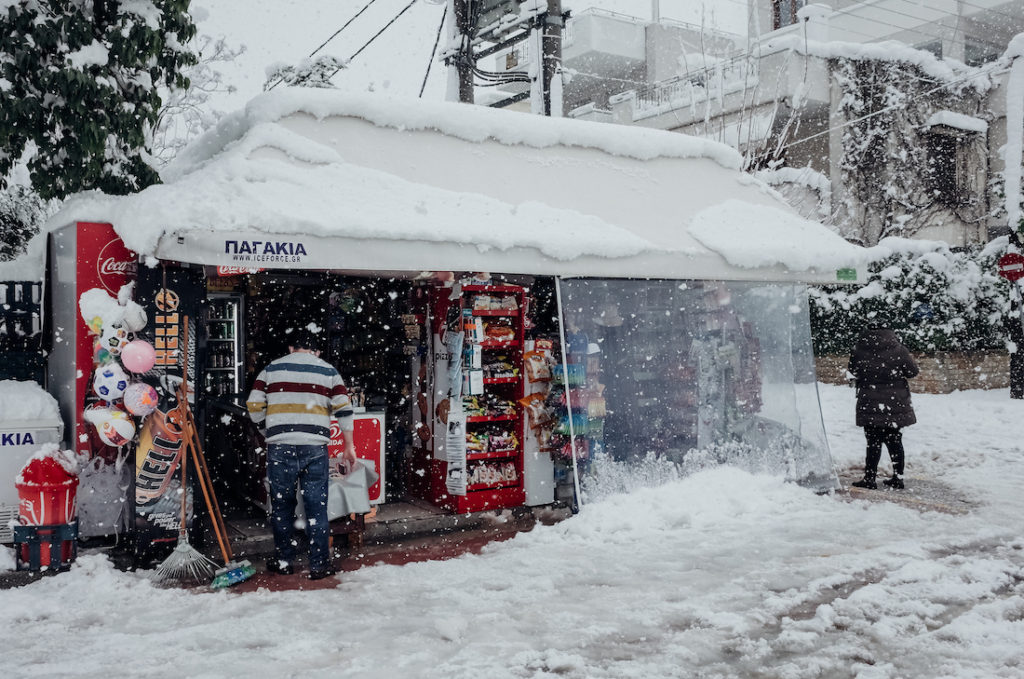
The cars created their own path in the snow. It was easier to walk there, especially on the main streets. There were not so many people walking. It seemed that most either stayed indoors or preferred to make snowmen in the nearby parks and gardens.
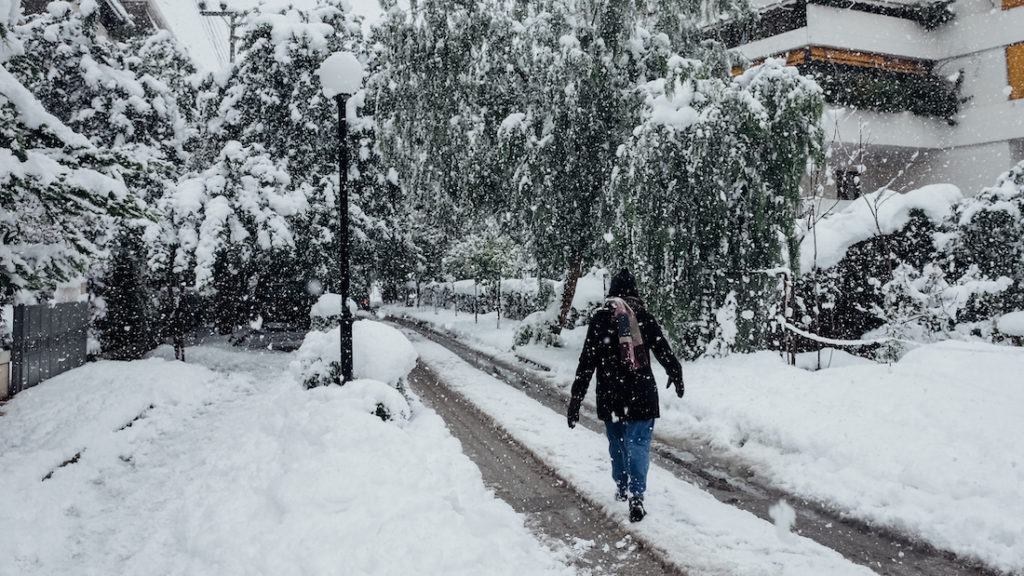
One of the most common fruits you’ll find in Athens is the bitter orange (or Citrus × Aurantium). Athens is full of them. The tourists are always fascinated. They assume these are proper oranges, and they want to taste them. However, there’s an equal amount of disappointment when they try them. As their name betrays, they are bitter. Actually, they are extremely bitter. Nothing terrible will happen if you eat them, but their bitterness is strong.
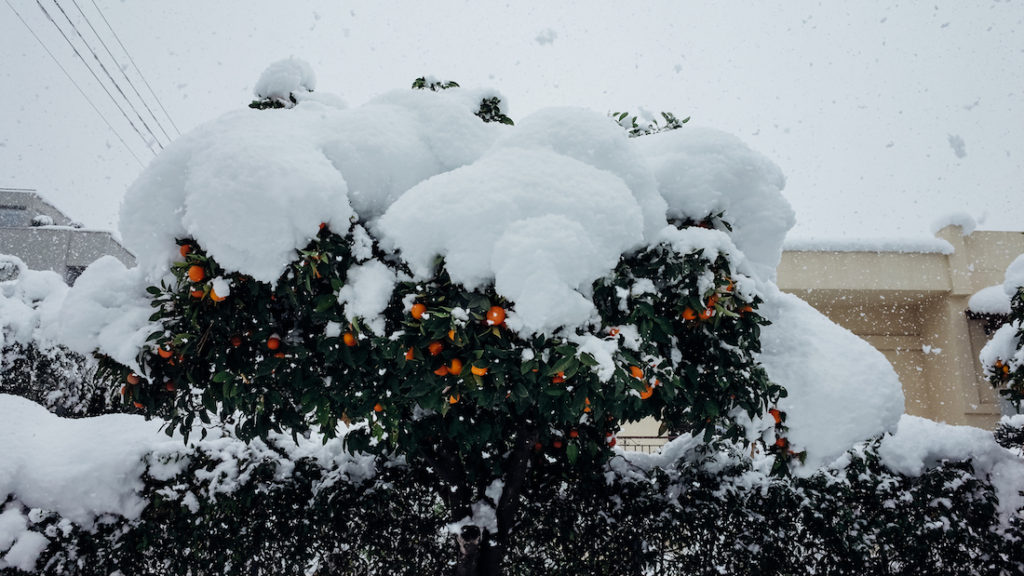
Lemons are bitter anyway, and they are probably less fascinating. However, there are plenty of lemon trees in Athens too, and here you can see a lemon with some ice on top. It probably looks more delicious than it really is.
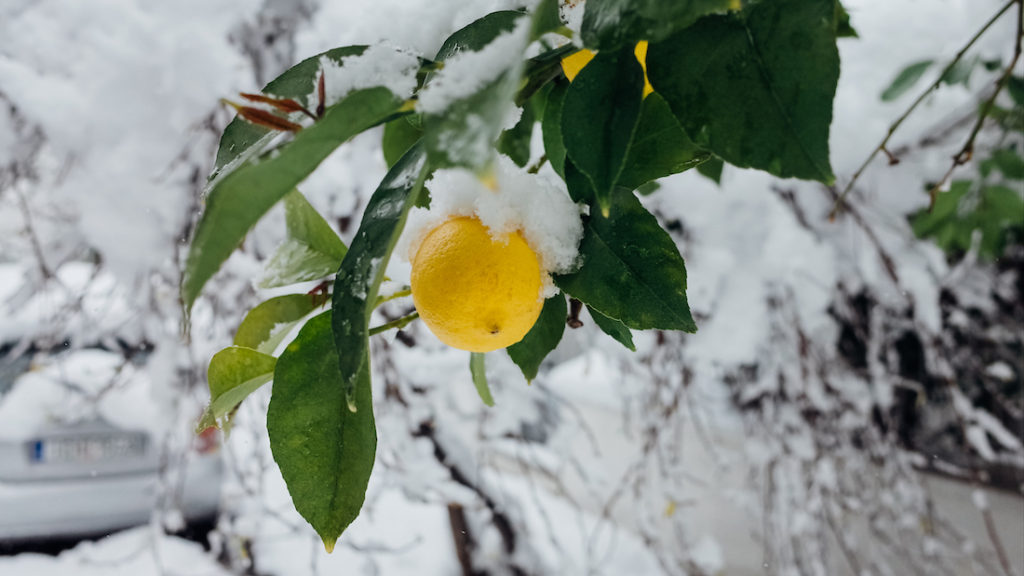
It was snowing a lot throughout my walk, and the sidestreets were totally white. No cars, no passersby, just thick snow that covered everything. From what I heard in the local news, there were approximately 25-30 centimeters of snow in the neighborhood.
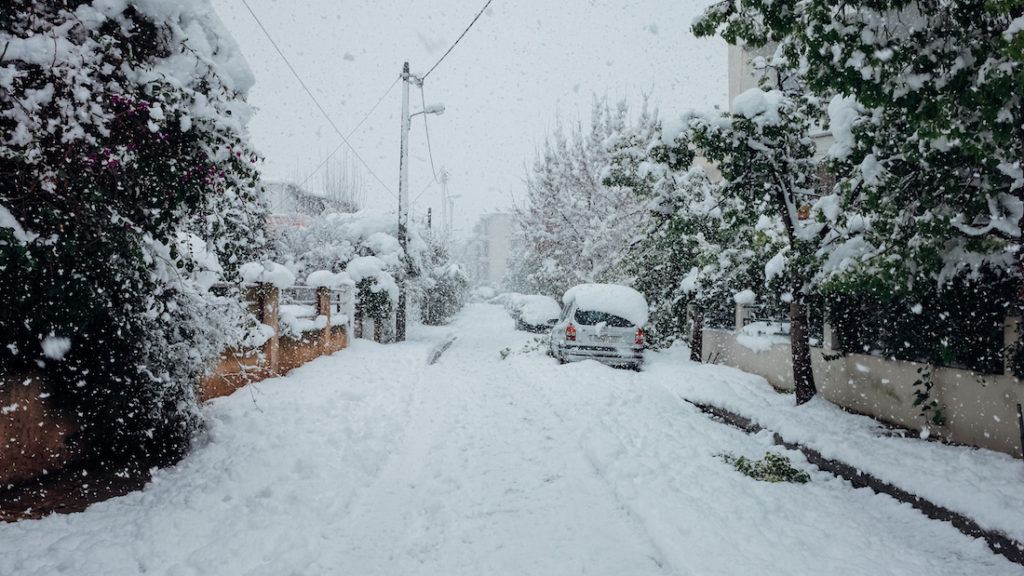
During my walk, I saw a man cutting down some trees several times. Many trees have fallen due to the snowfall and the strong northern wind. This actually resulted in extensive power cuts because the fallen trees damaged the electricity network. Several areas of Athens remained without electricity for more than 48 hours. I can’t say if the man was a state worker or a civilian dealing with the issue. But he had a chainsaw and cut the fallen trees into smaller pieces. A good thing to do for the city’s life and a nice extra for the fireplace.
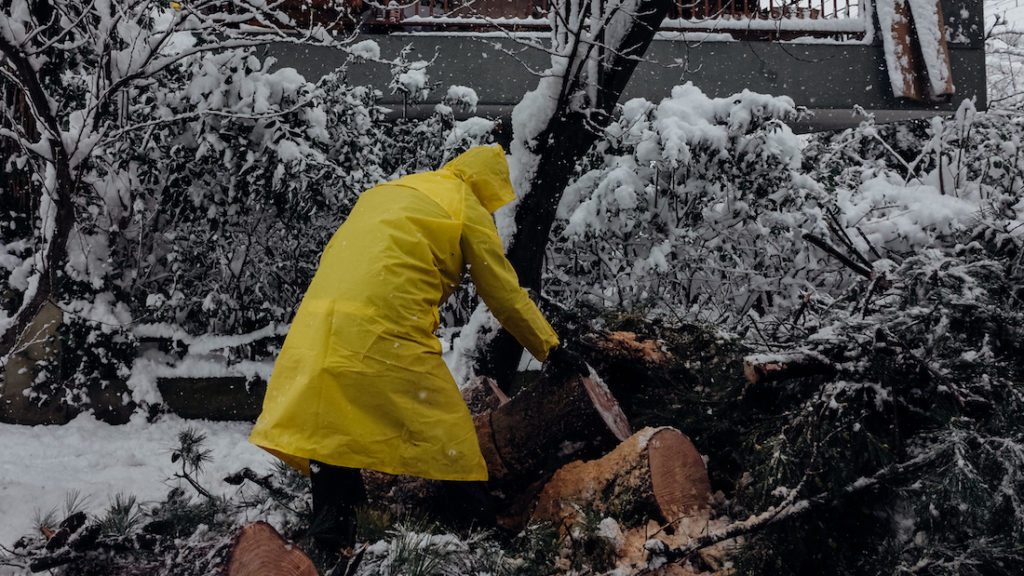
In a nearby field, I spotted a camper. This RV seemed to be there forever. Covid demonized traveling and non-essential moving. Add on top the snow in Athens, and you have an idea of the sad present of this vehicle.
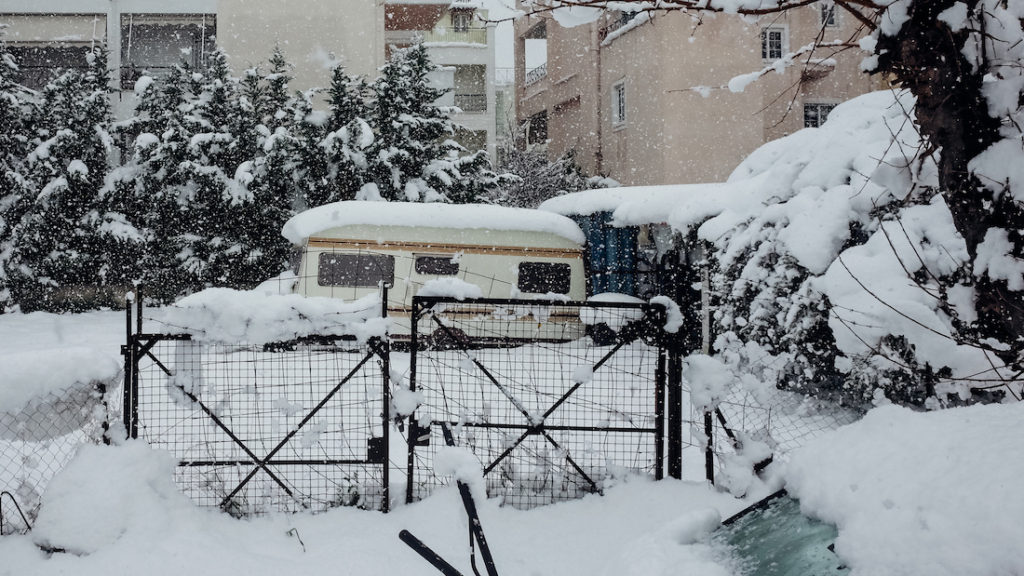
Some people thought of making their snowman more compatible with 2021. They added a medical mask to their snowman. A sad but compatible image for the 2021 flockdown (I’ll explain shortly what a flockdown is).
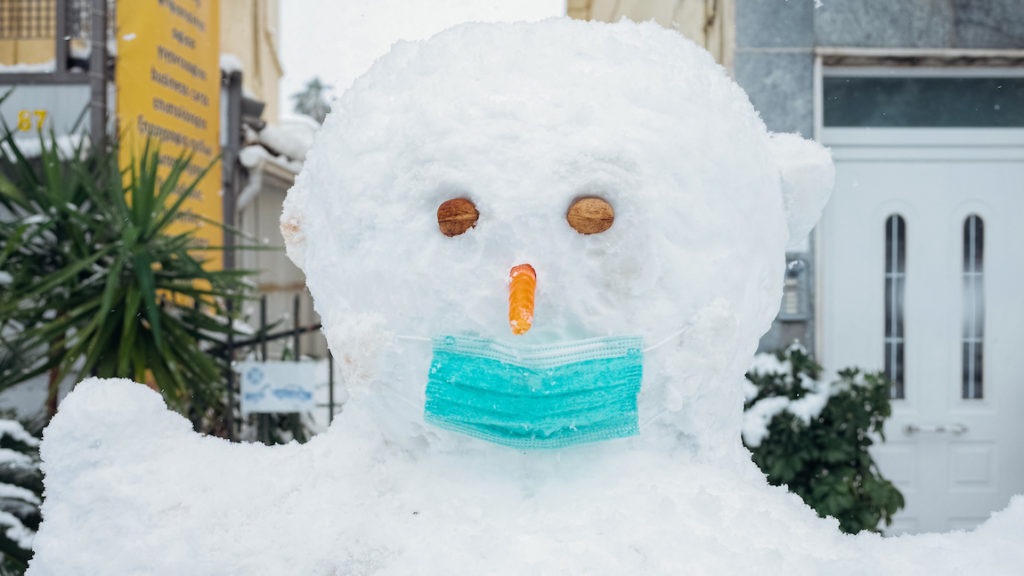
The schools are currently shut everywhere in Greece, but a couple of kids found their way to the schoolyard. It was not for attending classes but just for some snowball fight. It was really refreshing to hear their voices because our cities feel (and are) dead lately.
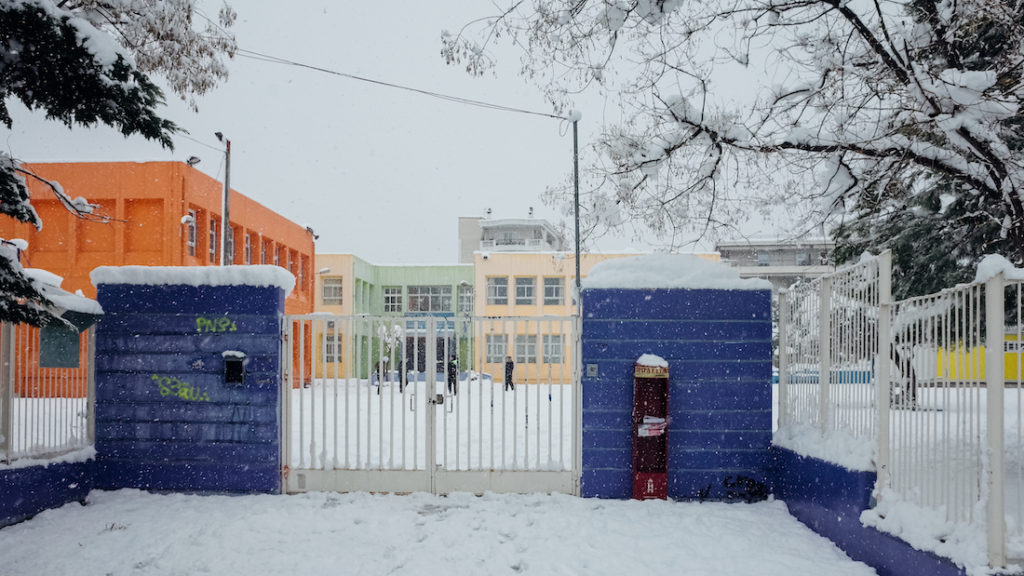
Last but not least, I thought of reaching a busier intersection to see if there was enough snow there too. More traffic usually translates to less snow. Even though there’s a clearer path, as you can see, there was lots of snow there too.
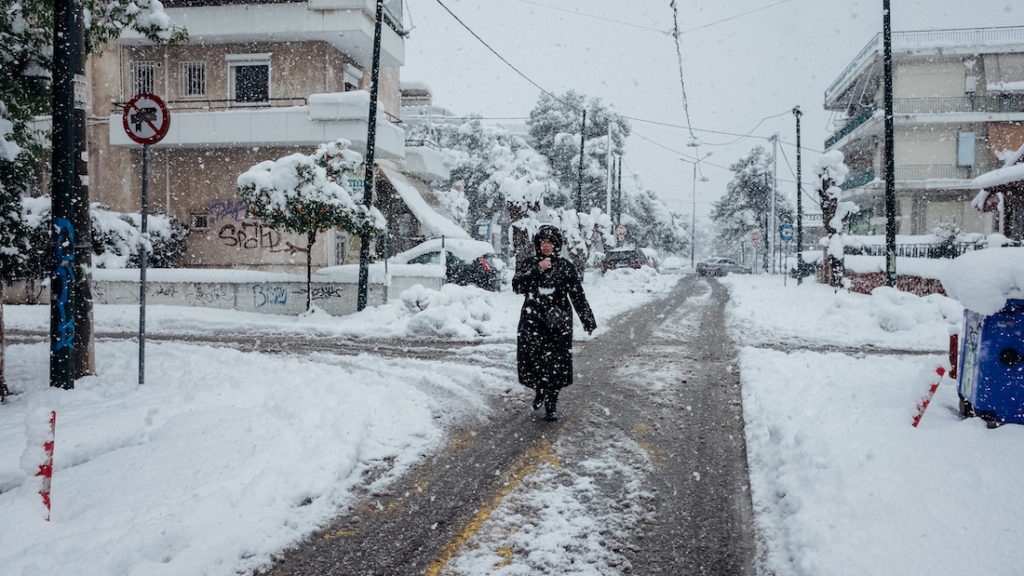
And that’s it with this small photo report from the snow in Athens. Please check my Polaroid Diary from the snowy days if you want to see some more photos.
What is a flockdown?
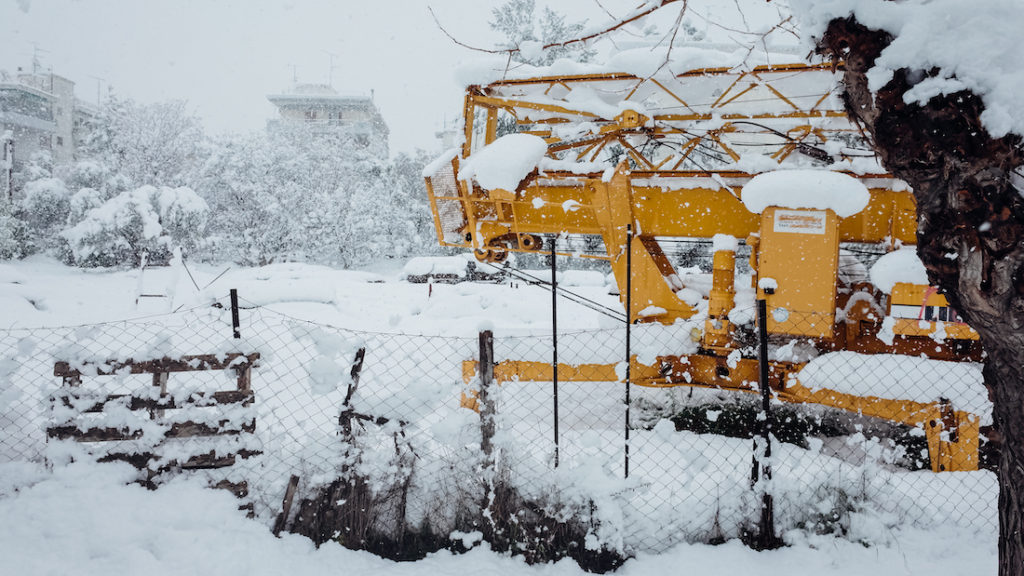
I came across the term Flockdown in the German news. It’s a compound word that combines “Flocken,” which in German means flakes (Schneeflocken=Snowflakes) and Lockdown. More or less, it describes the severe snowfalls that coincide with the coronavirus lockdowns. It refers naturally to heavy snowfalls that require you to stay at home.
According to some sources, it first appeared (oddly) in May 2020. It re-emerged as a trending word in January 2020 and made it to the German news earlier this February. The term Flockdown also became a hashtag on Social Media: see #Flockdown on Twitter and Instagram.
So, does it snow in Athens?
Yes. While heavy snowfalls are rare, it’s possible to see some snow during January and February. However, the snow will melt quickly in downtown Athens and will remain a bit longer in the northernmost suburbs. For snow lovers, your safest bet to see some snow is to visit Parnitha, Penteli, and Hymettus, the mountains of Attica.
Snow in Athens: Cold Front Names
Finally, here’s one last section about the names given on the cold fronts that hit Athens the last years:
- Cold Front Medea – February 2021
- Filippos – January 2022
- Cold Front Barbara – February 2023
More about Greece: Greek islands on a budget, 1-week itineraries in Greece
Pin it for later
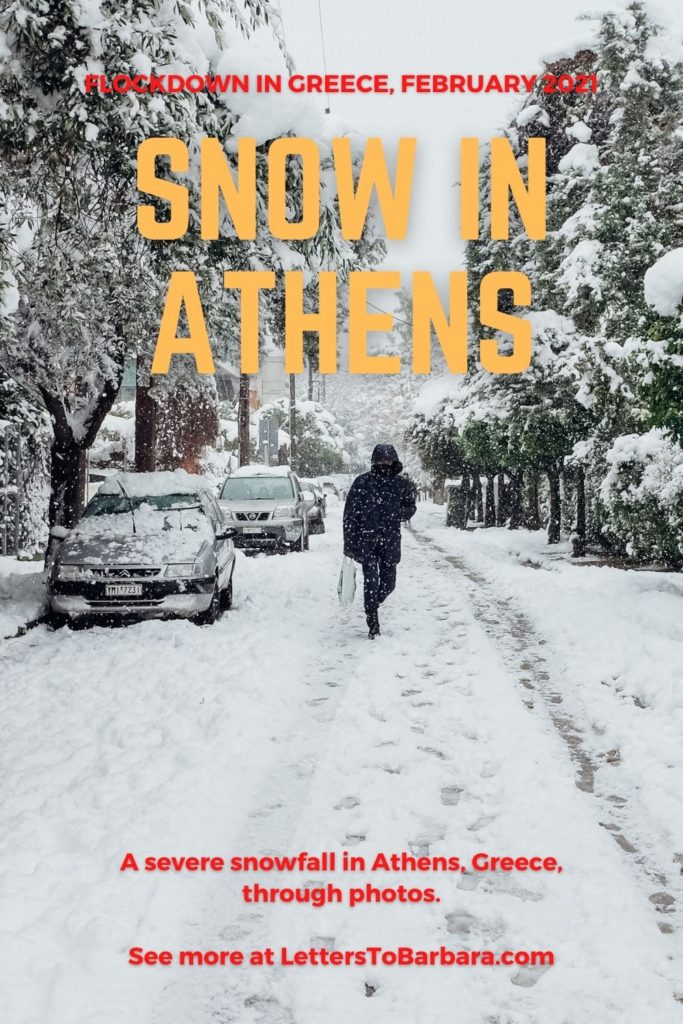
Did you enjoy reading about the Snow in Athens? Feel free to share it with your friends on Facebook, Twitter, or Pinterest.
Last Updated on February 3, 2023 by George Pavlopoulos
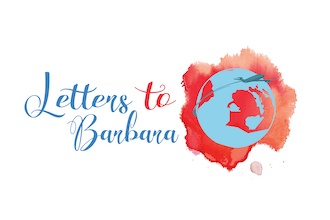


Very impressive photographs, beautiful imagery as always – your images are absolutely on par with those in the Guardian’s article. I think it’s most important to document these rare moments.
Please tell me, are the Greek bitter oranges being exported? I guess they would be perfect for a fantastic Orange Marmalade?
Hello Christian!
Thank you so much for your kind words. So glad that you enjoyed the photos. Due to the current regulations, it was unfortunately hard to document more of the snowy days. I wish I could visit the city center (or should I say “travel” under the current restrictions?) and take more photos.
Great question about the bitter oranges. Unfortunately, I don’t know if Greece exports them. But what I can tell you is that the Greeks make marmalade out of them. It’s usually homemade, but I’ve also seen it sold in local shops. I’ll ask around, and I will let you know.
Hey George,
For me, I feel that snow makes everything look so magical. Even though I hate winters, I am always up for a trip where I might get to see snowfall. The pictures you captured are so gorgeous. Loved going through this photo-report 😉
Hello dear Pooja,
Thanks a lot; I’m really glad you enjoyed the photo-report. I’m always up for some snow, but lately (probably because of the current situation), I’m always looking forward to the summertime. When this thing is over, I’d love to go up north, though, most likely Norway, and see some real snow!
All the best,
George